Related Research Articles

The Steve Miller Band is an American rock band formed in 1966 in San Francisco, California. The band is led by Steve Miller on guitar and lead vocals. The group had a string of mid- to late-1970s hit singles that are staples of classic rock, as well as several earlier psychedelic rock albums. Miller left his first band to move to San Francisco and form the Steve Miller Blues Band. Shortly after Harvey Kornspan negotiated the band's contract with Capitol Records in 1967, the band shortened its name to the Steve Miller Band. In February 1968, the band recorded its debut album, Children of the Future. It went on to produce the albums Sailor, Brave New World, Your Saving Grace, Number 5, The Joker, Fly Like an Eagle, Book of Dreams, among others. The band's Greatest Hits 1974–78, released in 1978, sold over 13 million copies. In 2016, Steve Miller was inducted as a solo artist in the Rock and Roll Hall of Fame.
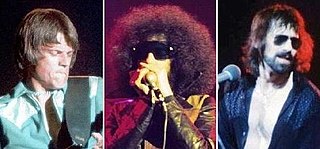
The J. Geils Band was an American rock band formed in 1967, in Worcester, Massachusetts, under the leadership of guitarist John "J." Geils. The original band members included vocalist Peter Wolf, harmonica and saxophone player Richard "Magic Dick" Salwitz, drummer Stephen Bladd, vocalist/keyboardist Seth Justman, and bassist Danny Klein. Wolf and Justman served as principal songwriters. The band played R&B-influenced blues rock during the 1970s and soon achieved commercial success before moving toward a more mainstream radio-friendly sound in the early 1980s, which brought the band to its commercial peak. They performed a mix of cover songs of classic blues and R&B songs, along with original compositions written primarily by Wolf and Justman, as well as some group compositions written under the pseudonymous name Juke Joint Jimmy, representing compositions credited to the entire band as a whole. After Wolf left the band in 1983 to pursue a solo career, the band released one more album in 1984 with Justman on lead vocals, before breaking up in 1985. Beginning in 1999, the band had several reunions prior to the death of its namesake, J. Geils, on April 11, 2017.

Andrew Piran Bell is a Welsh singer, songwriter, musician, record producer, and DJ. He is one of two vocalists and guitarists of the English rock band Ride, and was formerly the bassist of Oasis from 1999 until their breakup in 2009. Bell was also a member of Hurricane #1 as well as Liam Gallagher's post-Oasis project Beady Eye until their breakup in 2014.

Mr. Wonderful is the second studio album by British blues rock band Fleetwood Mac, released on 23 August 1968. This all-blues album was broadly similar to their debut album, albeit with some changes to personnel and recording method. The album was recorded live in the studio with miked amplifiers and PA system, rather than plugged into the board. A horn section was introduced and Christine Perfect of Chicken Shack was featured on keyboards. The album took a total of four days to record. In the US, the album was not issued under the name Mr. Wonderful, though around half of the tracks appeared on English Rose.
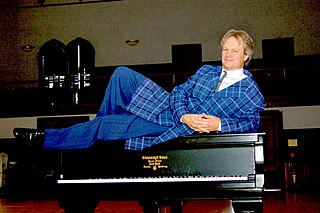
Erik Lindgren is an American composer and pianist. He runs Arf! Arf! Records, and has led or been a member of several ensembles such as The Space Negros and Birdsongs of the Mesozoic.

James Henry Cotton was an American blues harmonica player, singer and songwriter, who performed and recorded with many fellow blues artists and with his own band. He also played drums early in his career.
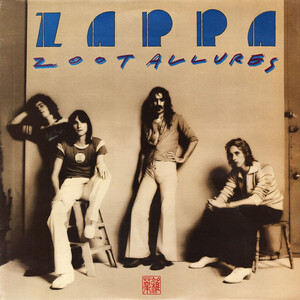
Zoot Allures is the 22nd album by the American rock musician Frank Zappa, released in October 1976 and his only release on the Warner Bros. Records label. Due to a lawsuit with his former manager, Herb Cohen, Zappa's recording contract was temporarily reassigned from DiscReet Records to Warner Bros.

Loggins and Messina was an American pop rock duo consisting of Kenny Loggins and Jim Messina, who achieved major chart success during the early-mid 1970s. Among their well-known songs are "Danny's Song", "House at Pooh Corner", and "Your Mama Don't Dance". After selling more than 16 million records and becoming one of the leading musical duos of the 1970s, Loggins and Messina separated in 1976. Although Messina would find only limited popularity following the breakup, Loggins went on to achieve major chart success in the 1980s. In 2005 and again in 2009, Loggins and Messina reformed for tours in the United States.
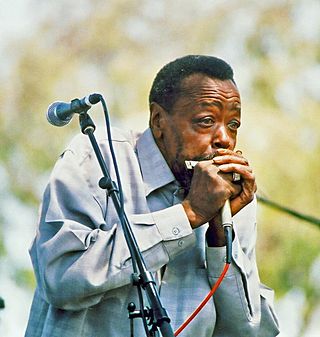
Carey Bell Harrington was an American blues musician who played harmonica in the Chicago blues style. Bell played harmonica and bass guitar for other blues musicians from the late 1950s to the early 1970s before embarking on a solo career. Besides his own albums, he recorded as an accompanist or duo artist with Earl Hooker, Robert Nighthawk, Lowell Fulson, Eddie Taylor, Louisiana Red and Jimmy Dawkins and was a frequent partner with his son, the guitarist Lurrie Bell. Blues Revue called Bell "one of Chicago's finest harpists." The Chicago Tribune said Bell was "a terrific talent in the tradition of Sonny Boy Williamson and Little Walter." In 2023, he was inducted in the Blues Hall of Fame.
Epidemic was an American death/thrash metal band which was part of the Bay Area thrash scene.

Life is the 17th studio album by Canadian musician Neil Young and his American backing band Crazy Horse, and it is Young's last release on the Geffen label. As with their 1979 album Rust Never Sleeps, most of the songs were recorded live with later studio overdubs. The album was released on July 6, 1987.

Heartbreak Express in the twenty-fourth solo studio album by American entertainer Dolly Parton. It was released on March 29, 1982, by RCA Records. The album returned Parton to a more fully realized country sound, after her late 1970s pop recordings. The album's first single, "Single Women", a slow-tempo honkytonk ballad about a singles bar, was written by Saturday Night Live writer Michael O'Donoghue, and had previously appeared in an SNL skit in late 1980. The single provided a top ten single for Parton. The title cut also was a top ten hit for her. "Do I Ever Cross Your Mind" appeared as a double-A-sided single, and reached No. 1 on the country charts in August 1982.
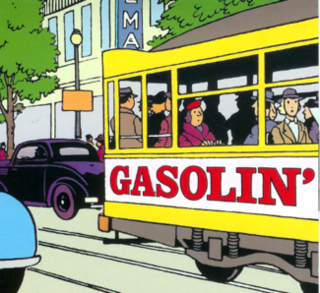
Gasolin' (also called Gas 1) is the debut studio album by Danish rock band Gasolin'. It was released in November 1971 by CBS Records. Instead of boogie rock and catchy tunes, they relied on creating songs with a moody feel such as "Langebro", "Fra dag til dag" and "Tremastet beton". The latter is recited by the poet Mogens Mogensen. Lead singer Kim Larsen later jokingly referred to the song as the first Danish rap. The lyrics and the music have a dark and mysterious ambience. From this album "Langebro" was released on the single with "Lilli-Lilli" on the b-side.

It'll Shine When It Shines is the second album by the American country rock band The Ozark Mountain Daredevils, released in 1974.
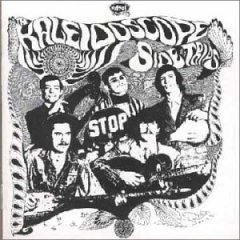
Side Trips is the debut studio album by American band Kaleidoscope. It was released in May 1967, on Epic Records BN 26304, and re-released on vinyl by Sundazed Records (2007). The album has a raw, non-limited instrumental mentality, for each member played many instruments; for example, David Lindley played guitar, banjo, fiddle, and mandolin, and Solomon Feldthouse played saz, bouzouki, dobro, vina, oud, doumbek, dulcimer, fiddle, guitar, and vocals.

Interstellar Low Ways is an album recorded by the American jazz musician Sun Ra and his Myth Science Arkestra, mostly recorded in Chicago, 1960, and released in 1967 on his own El Saturn label. Originally titled Rocket Number Nine, the album had acquired its present name, and the red-on-white sleeve by Claude Dangerfield, by 1969. The album is known particularly for the two songs featuring chants, "Interplanetary Music" and "Rocket Number Nine Take off for the Planet Venus". These would stay in the Arkestra's repertoire for many years.
Rocket Number Nine points toward the music that the Arkestra would be playing on the lower East Side of New York City. The tenor sax solo isn't the work of John Coltrane in 1962, but of John Gilmore in 1960. And not even Ornette Coleman's bassists were playing like Ronnie Boykins at this date.
The Lost was an American garage rock and psychedelic band from Plainfield, Vermont who were active in the Boston rock scene 1960s. They were initially an interracial rock band, one of the few at the time, and, along with the Remains and the Rockin' Ramrods, later became one of the most popular live acts in Boston, landing a contract with Capitol Records. In spite of having a regional hit with their first record, they were unable to find greater commercial success and broke up in 1967. In the intervening years their work has come to the attention of garage rock collectors and enthusiasts with the release of the anthology, Early Recordings and Lost Tapes, on Arf! Arf! Records.

Music in space is music played in or broadcast from a spacecraft in outer space. The first ever song that was performed in space was a Ukrainian song “Watching the sky...”(“Дивлюсь я на небо”) sang on 12 August 1962 by Pavlo Popovych, cosmonaut from Ukraine at a special request of Serhiy Korolyov, Soviet rocket engineer and spacecraft designer from Ukraine. According to the Smithsonian Institution, the first musical instruments played in outer space were an 8-note Hohner "Little Lady" harmonica and a handful of small bells carried by American astronauts Wally Schirra and Thomas P. Stafford aboard Gemini 6A. Upon achieving a space rendezvous in Earth orbit with their sister ship Gemini 7 in December 1965, Schirra and Stafford played a rendition of "Jingle Bells" over the radio after jokingly claiming to have seen an unidentified flying object piloted by Santa Claus. The instruments had been smuggled on-board without NASA's knowledge, leading Mission Control director Elliot See to exclaim "You're too much" to Schirra after the song. The harmonica was donated to the Smithsonian by Schirra in 1967, with his note that it "...plays quite well".
Matthew Skoller is an American Chicago blues harmonicist, singer, songwriter, and record producer. He has released five albums, as well as recording his harmonica playing on other musicians work, including John Primer, Lurrie Bell, Koko Taylor, H-Bomb Ferguson, Toronzo Cannon, Bernard Allison, Larry Garner, Big Daddy Kinsey, Big Time Sarah, Michael Coleman, and Harvey Mandel. On stage, he has supplied part of the backing to Big Time Sarah, Jimmy Rogers, and Deitra Farr.
References
- ↑ "The Space Negros reviews, music, news". Sputnik Music.
- 1 2 "Space Negros music, videos, stats, and photo".
- 1 2 "Space Negros". Trouser Press .
- ↑ 1975-1987, with a timeout/reboot "The Space Negros". Rate Your Music .